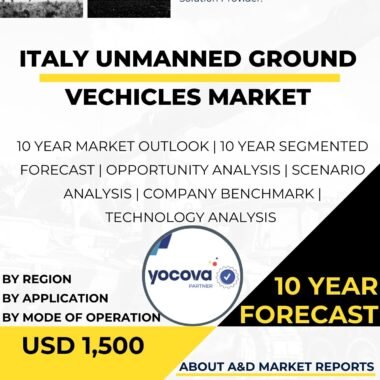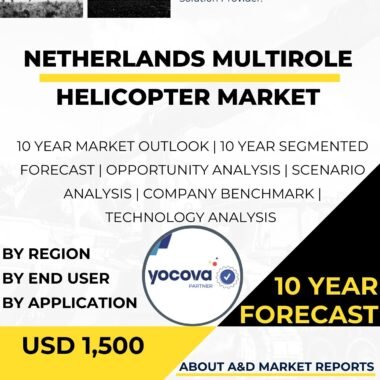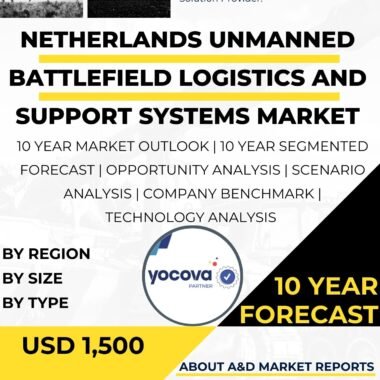Description
Germany unmanned ground vehicles (UGVs) market has been a significant and dynamic segment within the country’s defense, security, and industrial sectors. Unmanned ground vehicles refer to autonomous or remotely operated vehicles that navigate and operate on the ground without the need for human drivers. These advanced systems play a crucial role in enhancing Germany’s military capabilities, supporting law enforcement operations, and driving innovation in various industrial applications.
The Germany unmanned ground vehicles market is influenced by several factors, including the country’s commitment to national defense, its role as a key member of NATO, and its recognition of the importance of advanced autonomous technologies in modern warfare and security operations. As a leading European economy and a technologically advanced nation, Germany understands the significance of investing in cutting-edge unmanned systems to maintain military readiness, enhance security, and foster technological leadership.
The market encompasses both domestic production and imports of unmanned ground vehicles and related technologies. Germany has reputable defense contractors, technology firms, and automotive companies that develop and manufacture a wide range of UGVs, including reconnaissance robots, logistics vehicles, and bomb disposal robots. Additionally, Germany collaborates with other countries and imports UGVs to benefit from technological cooperation and meet specific operational requirements.
The Germany unmanned ground vehicles market is characterized by a focus on innovation and technological advancements. Companies in Germany continuously strive to develop state-of-the-art UGVs with improved autonomy, mobility, payload capacity, and communication capabilities. The integration of advanced sensors, artificial intelligence (AI), and data analytics has been a key area of research and development to enhance the performance and versatility of German UGVs.
The export potential of German unmanned ground vehicles is another important aspect of the market. Germany’s reputation for producing high-quality and reliable defense and industrial equipment has made it an attractive supplier for other countries seeking advanced UGV solutions for their military forces, security agencies, and various industrial applications. However, export decisions are subject to international regulations and political considerations, especially when it comes to the export of sensitive military technologies.
The Germany unmanned ground vehicles market also addresses challenges related to safety and cybersecurity. As UGVs operate autonomously or under remote control, ensuring their safe navigation and operation in various environments, including urban and hazardous areas, is essential to prevent accidents and mitigate potential risks. Additionally, UGVs are increasingly interconnected and reliant on communication networks, and ensuring the security and resilience of these networks is critical to maintaining operational security and safeguarding sensitive data.
In recent years, there has been a growing emphasis on the development of UGVs with multi-functional capabilities, enabling them to perform a wide range of tasks and missions. Germany is investing in research and development to explore how UGVs can support military forces and security agencies in various scenarios, such as reconnaissance, surveillance, logistics, and search and rescue operations.
Challenges faced by the Germany unmanned ground vehicles market include the need to adapt to evolving operational requirements and emerging technologies. As the nature of warfare and security threats evolves, UGVs must continuously evolve to meet new challenges, including the integration of AI, machine learning, and autonomous decision-making capabilities.
The market also needs to address concerns related to cost-effectiveness and the need to balance investments in UGV technology with other defense, security, and industrial priorities. UGVs can be resource-intensive to develop, procure, and maintain. Decision-makers must carefully prioritize investments to ensure that UGV capabilities align with Germany’s broader defense, security, and industrial requirements.
In conclusion, the Germany unmanned ground vehicles market is a significant and dynamic segment within the country’s defense, security, and industrial sectors. Advanced UGVs play a crucial role in enhancing Germany’s military capabilities, supporting law enforcement operations, and driving innovation in various industrial applications. The market is driven by Germany’s commitment to technological advancement, advancements in UGV systems, and the need to balance investments with other defense, security, and industrial priorities. As Germany continues to invest in research and development and explores innovative UGV solutions, the unmanned ground vehicles market is expected to play an increasingly pivotal role in shaping the country’s military capabilities, enhancing security operations, and driving advancements in autonomous technology across various industries.




